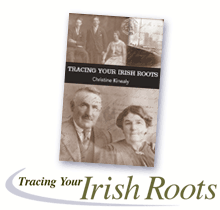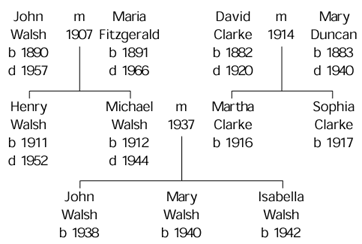 |
 | |||
|
 Genealogy in Ireland, the search for Irish roots or the rediscovery of long-lost links to the mother country, is a subject with global importance. There are more families with Irish roots in the United States of America, for instance, than in the whole of the island of Ireland. Irelandseye presents an 'Ireland Genealogy' course, extracted from Tracing Your Irish Roots by Christine Kinealy. Headings
Have you ever wondered about your forebears - where they lived, what their occupations were, how many children they had? Are you perhaps a descendant of Brian Boru, or of a seventeenth-century Scottish `planter'? Perhaps your great-grandfather was hanged for stealing sheep, or maybe your grandmother was a Poor Law Guardian? A knowledge of your family history will not only answer these and many other questions but it will also give you a greater understanding of Irish history and show the part that your ancestors have played in it. Over the last few years there has been a great increase in the number of people who want to find out more about their roots. Unfortunately, the pathway to the past can sometimes be rocky. Where do you start? What records and documents do you need? What information do they contain and where are they kept? And what do you do if you come to an apparent dead end? This article will provide you with an introduction on how to undertake a genealogical search and develop it as far as possible. Parish registers, census returns, gravestone inscriptions, newspapers and birth, death and marriage certificates - all these can contain vital information about your ancestors. And each can provide you with that crucial link to the next stage of your search. Success or failure can hinge on something seemingly unimportant. For example, suppose you are looking for ancestors with the surname Sullivan. If you have done your homework, you will know that this surname originally had the prefix `O' - a simple yet vital piece of information. Surname, religion, place of origin and occupation will provide clues that are all too easily overlooked by the untrained eye. Essentially, family history is a question of knowing which plot of earth is the most appropriate in which to sink your genealogical spade to commence root digging! Back to top
Starting OffAny genealogical search should begin at home. In fact, by devoting time to this important stage, you will probably save valuable time later in your search. On a large piece of paper, near the bottom, write your name. Then construct a line chart of your parents, grandparents and so on. You should end up with something like this:
 This simple family tree will help to show you the gaps in your knowledge. You may not be able to go much beyond your grandparents' generation. And it is quite probable that you don't even know your grandmother's maiden name. You may also be uncertain about exact dates of birth, death and marriage. However, don't despair! Once you have realised the extent and limits of your knowledge, you will have a much clearer idea of the task ahead. The next step is to try and fill in the gaps. Collect together as much family memorabilia as you can. Diaries, family bibles, newspaper cuttings, photographs - they all have a story to tell. Keep them together. Even if they don't contribute anything immediately, they may be useful at a later stage. Finally, approach other members of your family, particularly older relatives, and see what they can remember. Before long, you should have collected a wealth of interesting information. However, don't take every thing at face value: memories are notoriously unreliable so, wherever possible, check dates and ages against other sources. A golden rule of family history is write everything down. Do this from the very start of your search. If you don't, you will regret it later. Back to top
> > > Read the next page of this article
Tracing Your Irish Roots by Christine Kinealy, the essential and authoritative guide to discovering Irish ancestors is available from bookstores everywhere.
|
All Material © 1999-2008 Irelandseye.com and contributors

